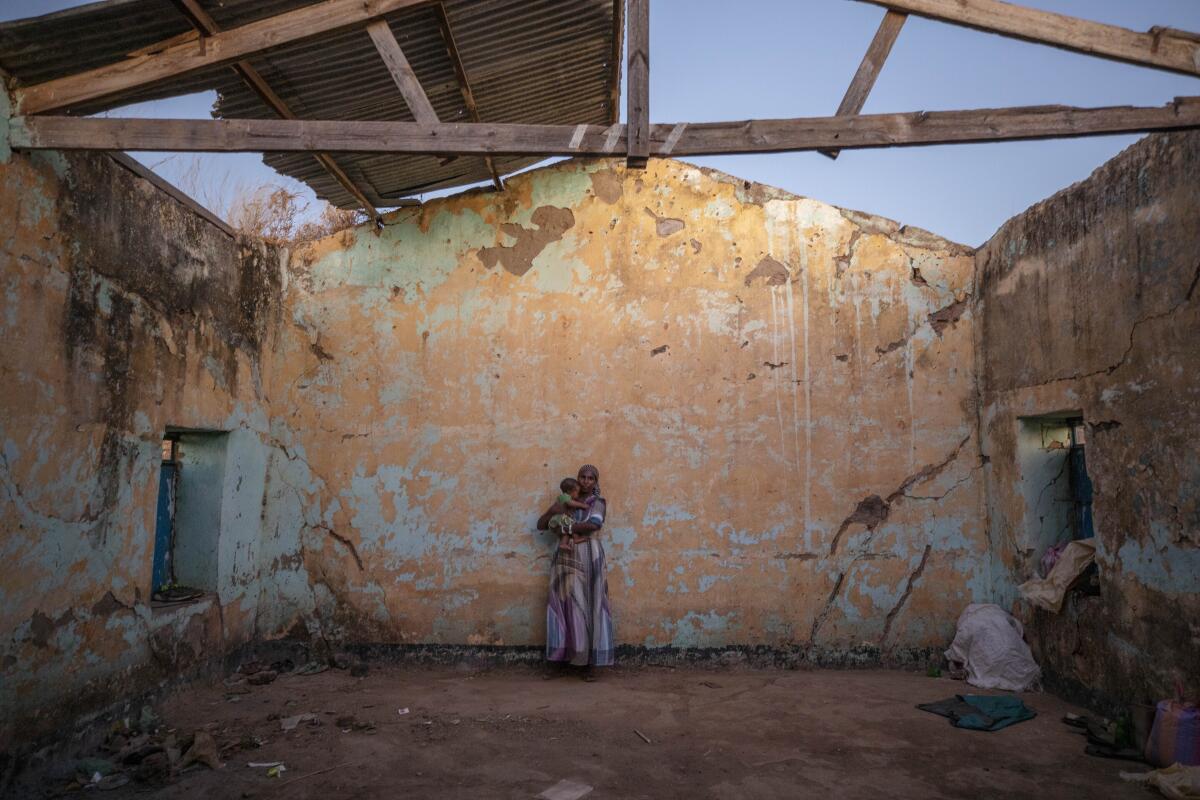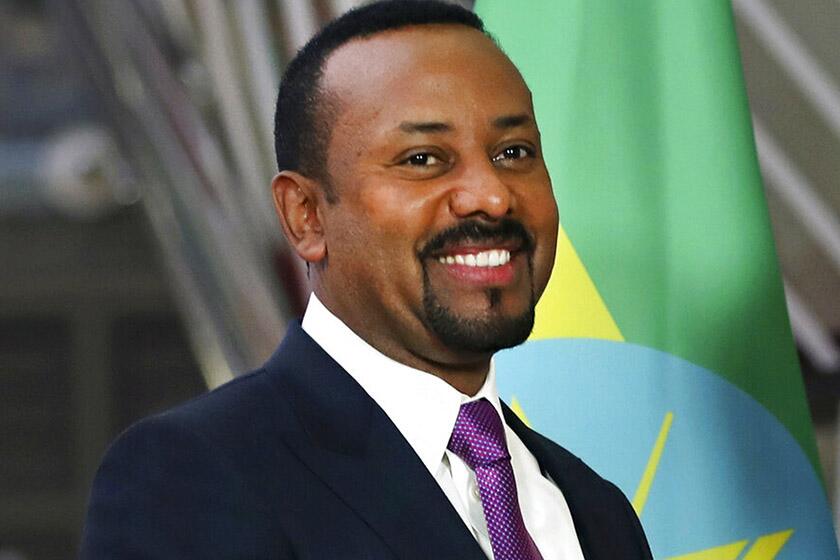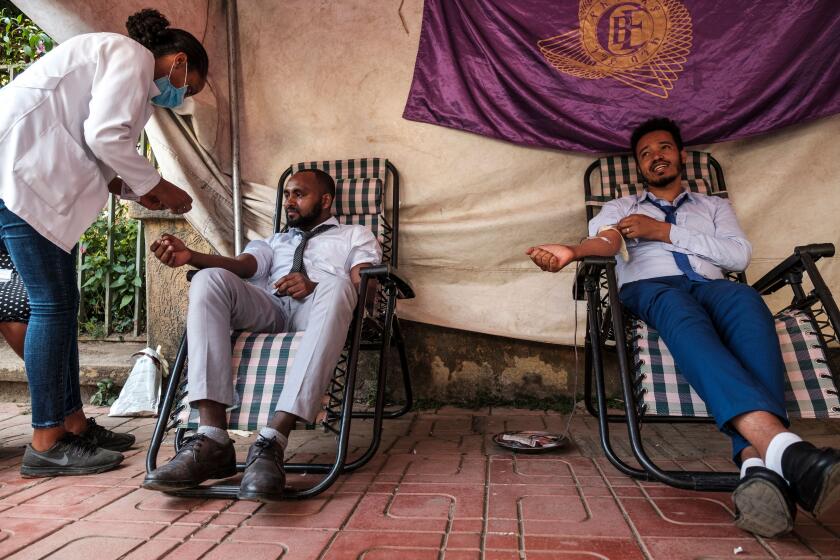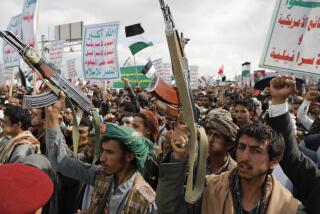Ethiopia’s forces shoot at and detain U.N. staffers in Tigray

- Share via
NAIROBI, Kenya — Ethiopia’s security forces shot at and detained United Nations staffers as they tried to reach part of the embattled Tigray region, a senior official said Tuesday, and he blamed the U.N. staffers for trying to reach areas where “they were not supposed to go.”
The shooting occurred amid soaring frustration among humanitarian officials as desperately needed aid was still not freely reaching the Tigray region more than a week after the U.N. and Ethiopia’s government signed a deal for access.
The senior government official, Redwan Hussein, told reporters the U.N. employees “broke” two checkpoints and were trying to go through a third when they were fired upon. He said the staffers had since been released.
“They were told in some areas they were not supposed to move,” he said. “But they indulged themselves in a kind of adventurous expedition.”
United Nations spokesman Stephane Dujarric called the report “alarming” and said U.N. officials were “engaging at the highest level with the federal government to express our concerns and avoid any such incidents in the future.”
He said the four U.N. staffers on Sunday had been trying to assess roads, a key step before larger aid convoys can go in. Another U.N. spokesman, Farhan Haq, said the staffers were stopped at a military checkpoint near Sheraro. The town is near the Eritrean border.
The irony of Ethiopian Prime Minister Abiy Ahmed, a Nobel Peace Prize winner, engaging in war has not been lost on international observers.
Ethiopia’s government is making it clear it intends to manage the flow of humanitarian aid, but the U.N. has openly sought unfettered and neutral access according to international principles.
“The situation on the ground is complicated” at the local level, Dujarric said, and discussions continue with the government “to try to get where we want to be.”
Crucially, the deal allows aid only in areas under Ethiopian government control. The government on Tuesday said 44 truckloads of food aid had been delivered to Shire, the main town near the refugee camps.
Ethiopia’s government late last month declared victory in the conflict in the Tigray region against the Tigray People’s Liberation Front. The government asserts that the fighting has stopped except for some “sporadic shootings,” but the TPLF has said fighting continues. The TPLF leaders are on the run.
Food, medicines and other aid for some 6 million people — about 1 million of them now displaced — hang in the balance. Of special concern are camps that are home to nearly 100,000 refugees from Eritrea amid reports that they have been attacked and abducted. The camps are near the border with Eritrea, which some fleeing people have accused of entering the conflict, a charge that Ethiopia denies.
Food ran out at the camps days ago.
“Regaining access to refugees and others in need is urgent and critical for UNHCR and humanitarian organizations,” the head of the U.N. refugee agency, Filippo Grandi, tweeted Tuesday.
The head of the Norwegian Refugee Council, Jan Egeland, said his organization was “deeply concerned to find that humanitarian access to the region is still significantly constrained. ... These people can no longer be made to wait. Aid must not be left at a standstill. We have been standing ready to deliver food, emergency shelter and other essential materials for weeks, and we expected this deal to clear the way.”
The U.N. announced the deal with Ethiopia’s government last Wednesday, saying it was signed on Nov. 29.
The fighting in the region erupted Nov. 4 between Ethiopia’s government and the government of the Tigray region following months of rising tensions. Since then, aid-laden trucks have waited at the borders of Tigray, even as warnings have become increasingly dire about the lack of food, fuel, clean water, cash and other necessities.
“Full access for humanitarian actors must be guaranteed,” EU foreign policy chief Josep Borrell tweeted Tuesday.
Ethiopia nears civil war, threatening the stability of one of the world’s most strategic regions. Here are key reasons for the international alarm.
Ethiopian Prime Minister Abiy Ahmed‘s office said Monday it was working with the U.N. and others to extend humanitarian assistance “with a well-coordinated framework led by the federal government.”
On Tuesday, Redwan repeated that message and added: “No entity, multilateral or unilateral, is supposed to supplant the government. ... We, the government, would call the shots.”
Humanitarian assistance must be escorted by defense forces, he said.
Even after Abiy declared victory on Nov. 28 in what he called a “law enforcement operation” against a Tigray government he now considers illegitimate, fighting has been reported in parts of the region, further complicating access for aid.
Thousands of people are thought to have been killed in the power struggle between the Tigray People’s Liberation Front, which dominated Ethiopia’s government and military for more than a quarter of a century, and the government of Abiy, who sidelined the TPLF soon after taking power in 2018 and introduced dramatic political reforms that won him the Nobel Peace Prize.
Now Abiy rejects dialogue with the TPLF. Both sides began the conflict heavily armed, leading to fears of another drawn-out conflict in the strategic Horn of Africa nation that is the continent’s second-most-populous country.
Nearly 50,000 Ethiopians have fled into neighboring Sudan, where another humanitarian crisis is growing as aid workers set up food, shelter and other care from scratch.
“It has been a month since I have taken my pills,” said one refugee, Aksamaweet Garazgerer, who says she has HIV and needs antiretrovirals. “I would go every day [to the clinic] and they say tomorrow it will come, the day after tomorrow it will come. But it has not come yet.”
More to Read
Sign up for Essential California
The most important California stories and recommendations in your inbox every morning.
You may occasionally receive promotional content from the Los Angeles Times.












